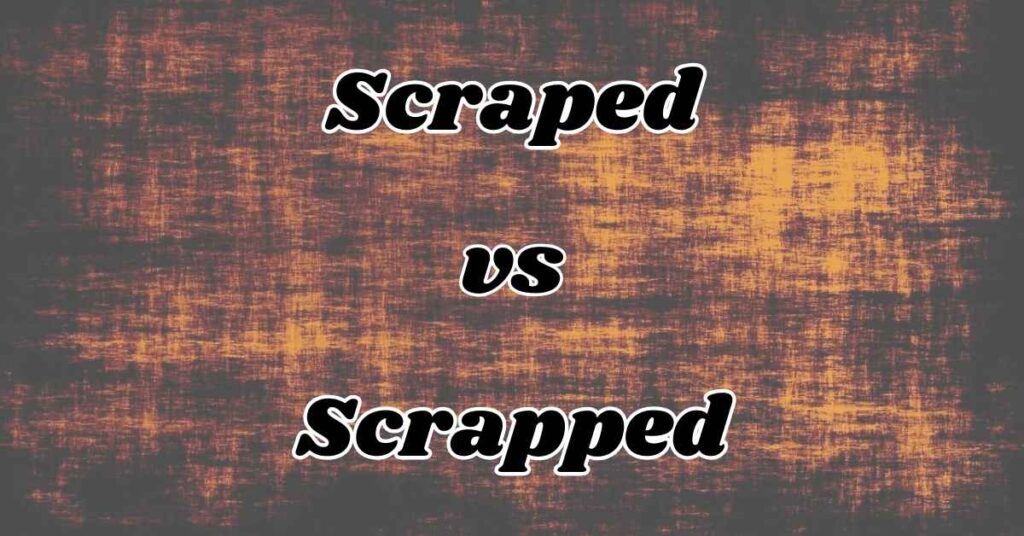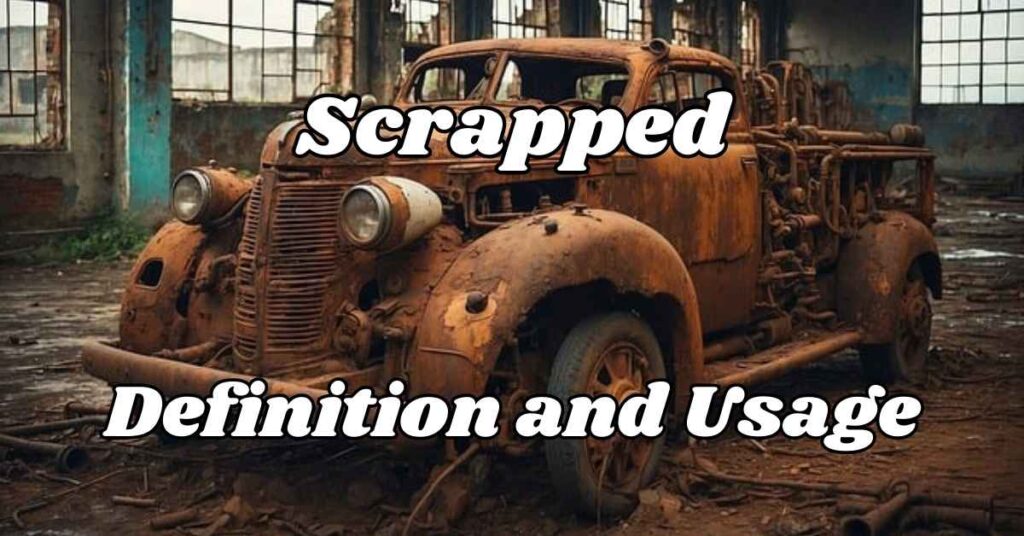Scraped vs Scrapped can often confuse many people, but understanding the difference between these two terms is essential for clear communication. While they sound similar, their meanings diverge significantly.
Scraped refers to the action of removing something from a surface, such as dirt or paint, often involving physical effort. In contrast, scrapped denotes the abandonment or cancellation of plans, projects, or items that are no longer useful.
This article will delve into the definitions, usages, and examples of both terms, helping you navigate their meanings with ease. By the end, you’ll confidently use scraped and scrapped in the right contexts.
Quick Summary
Scraped refers to the action of removing something from a surface, while scrapped means to discard or abandon something. Knowing when to use each word can enhance your communication skills and prevent misunderstandings.
Understanding Scraped vs Scrapped

The confusion between scraped and scrapped often arises because they sound alike but represent different actions. Scraped relates to a physical action—removing layers from surfaces, such as dirt or paint.
On the other hand, scrapped deals with the idea of cancellation or abandonment, often in a more abstract sense, such as scrapping plans or projects. Understanding these nuances is essential for clear communication.
Origins of the Scraped
“Scraped” has its origins in the early 13th century, derived from the verb “scrapen,” meaning to erase or remove material with a sharp instrument. It likely came from Old Norse skrapa and Old English scrapian, both meaning to scrape.
By the late 14th century, its meaning evolved to refer to removing outer layers. Additionally, “scraped” can indicate gathering resources with difficulty, as seen in phrases like “scraping together.” This word highlights both physical actions and metaphorical uses in various contexts, demonstrating its versatility in the English language.
Origins of the Scrapped
“Scrapped” originates from the late 14th century, derived from the word “scrappe,” meaning a small piece or fragment of food left after a meal. It comes from the Old Norse skrap, which translates to scraps or trifles.
Over time, “scrap” evolved to refer to any remnant or detached piece, often with a negative connotation. By the 18th century, “scrap” also denoted remains of metal collected for reworking. The verb form emerged in the late 19th century, meaning to discard or break down items into scrap, highlighting its significance in both physical and metaphorical contexts.
Scraped: Definition and Usage

“Scraped” refers to the action of removing something from a surface through friction or force. This can involve physical actions, such as scraping dirt off shoes or ice off a windshield.
Additionally, “scraped” can have metaphorical meanings, such as scraping together resources or ideas. Understanding the definition and usage of “scraped” is important for effective communication, as it conveys both literal and figurative actions.
Whether discussing cleaning tasks or gathering information, this term highlights the process of removal or collection in various contexts.
Scraped Definition
“Scraped” is the past participle of the verb “scrape,” which means to remove material from a surface. It implies a physical action that often involves using a tool or applying pressure. For example, you might say, “I scraped the paint off the old chair.”
Scraped Usage
“Scraped” is commonly used in various contexts. For instance, someone might say they scraped their knee while playing outside, indicating a physical injury.
In another context, a researcher may have scraped data from websites for analysis. This versatility makes “scraped” applicable in both casual and formal discussions.
Contextual Use of Scraped
The term can also have figurative meanings, such as when someone says they “scraped together enough money” for an expense. This suggests a struggle to gather resources but does not involve a physical action.
Synonyms of Scraped
Some synonyms for scraped include
- Removed
- Cleaned
- Scratched
- Abraded
- Scuffed
- Rasped
- Rubbed off
- Stripped away
- Cleared
- Wiped
Scrapped: Definition and Usage

“Scrapped” refers to the act of discarding or abandoning something that is no longer useful or relevant. This can apply to physical items, such as old machinery, or abstract concepts, like plans and ideas.
When something is scrapped, it signifies a decision to stop pursuing it, often due to factors like inefficiency or lack of interest. Understanding the meaning and usage of “scrapped” is essential for clear communication, especially in contexts involving business decisions, project management, or personal choices.
Scrapped Definition
“Scrapped” is the past participle of the verb “scrap,” which means to discard or eliminate. It indicates that an item, plan, or idea has been officially deemed unnecessary and is no longer being pursued. For example, a company might scrap a project that isn’t meeting its goals.
Scrapped Usage
For example, if someone says they “scrapped their vacation plans,” it means they decided not to go on the trip anymore.
Contextual Use of Scrapped
“Scrapped” can be used in various contexts. For instance, someone might say they scrapped their vacation plans due to unforeseen circumstances.
In business, a team may scrap a marketing campaign that fails to generate interest. This term effectively conveys the idea of abandonment in both personal and professional scenarios.
Synonyms of Scrapped
Synonyms for scrapped include
- Discarded
- Abandoned
- Canceled
- Rejected
- Thrown away
- Eliminated
- Forsaken
- Axed
- Shelved
- Terminated
Side by Side Comparison
| Aspect | Scraped | Scrapped |
| Definition | Removed from a surface | Discarded or abandoned |
| Usage Context | Physical actions like cleaning | Abandoning plans or projects |
| Examples | Scraping ice off a windshield | Scrapping an unprofitable product |
| Synonyms | Cleaned, scratched | Discarded, canceled |
Everyday Usage Examples

“Scraped” is commonly used in various everyday contexts, illustrating its versatility. Whether discussing physical actions or metaphorical meanings, “scraped” effectively conveys the idea of removal or effort.
Recognizing how this word fits into daily language can enhance communication and understanding in both casual and formal discussions.
Scraped Example
An example of “scraped” in everyday conversation could be, “I scraped the mud off my shoes before entering the house.” This sentence demonstrates the physical action of removing dirt, showcasing a typical usage of the term in a relatable context.
Examples of Scraping in Different Contexts
“Scraped” can also refer to gathering resources or information. For instance, a researcher might say, “I scraped data from several websites for my project.”
This illustrates how the term applies beyond physical actions to signify effortful collection in academic or professional settings.
Examples of Scraping In Business Context
In business settings, scraping often refers to gathering data efficiently. For instance:
- Companies might scrape customer reviews online to improve their services.
- Businesses may scrape competitor prices for market analysis.
- Data scientists often scrape information from various sources for research purposes.
Examples of Scraping In Construction
In construction work:
- Workers scrape old paint from walls before repainting.
- During renovations, crews scrape debris off floors.
- Removing old tiles often involves scraping them off surfaces carefully.
Examples of Scraping In Daily Life
In daily life:
- People scrape ice off their car windows during winter.
- You might scrape leftover food from your plate into the trash.
- When cleaning shoes after a muddy walk, you scrape off dirt before entering your home.
Scrapped Example
An example sentence using scrapped is: “The team scrapped their initial design after receiving feedback.” This indicates that they decided not to pursue that design anymore.
Examples of Scrapping in Different Contexts
“Scrapping” can be applied in various scenarios. For example, a company might scrap an unprofitable product line to focus on more successful items.
In another context, someone may scrap old furniture to create space for new pieces, highlighting the term’s relevance in both business and personal settings.
Examples of Scrapping In Business Context
In business scenarios:
- A startup might scrap its original business model after realizing it’s not viable.
- A company could scrap plans for an event due to low ticket sales.
- If a marketing campaign fails to attract customers, it may be scrapped entirely.
Examples of Scrapping In Construction
In construction:
- A contractor may scrap outdated blueprints that no longer meet regulations.
- Materials deemed unusable due to damage are often scrapped on-site.
- If budget constraints arise during construction projects, certain features may be scrapped altogether.
Examples of Scrapping In Daily Life
In everyday situations:
- People often scrap old clothes during spring cleaning.
- If plans change unexpectedly due to weather conditions, individuals might scrap their outdoor activities.
- Expired food items are typically scrapped during kitchen cleanouts.
The Past Tense of Scrap and Scrape
The past tense forms are scraped or scrapped, which can sometimes confuse people due to their similar sounds but different meanings in context. For example:
- “I scraped the floor clean yesterday.”
- “They scrapped the project last week.”
Understanding these forms helps clarify your communication further.
Common Mistakes and How to Avoid

“Scraped” and “scrapped,” common mistakes include confusing the two terms. “Scraped” refers to removing something from a surface, while “scrapped” means discarding or abandoning.
To avoid errors, ensure you understand the context of each word and use them appropriately in your writing and conversations.
Mistakes with “Scrapped vs. Scraped”
Many people mistakenly use these terms interchangeably because they sound alike but mean different things in context. For instance, saying “I scrapped my car” instead of “I scraped my car” can lead to misunderstandings about whether you are discussing damage or disposal.
How to Avoid Mistakes
To avoid mistakes with these terms:
- Remember that scraped relates to physical removal while scrapped refers to abandonment.
- Practice using each word in sentences until you feel comfortable with their meanings.
- When in doubt about which term fits best in your sentence contextually, think about whether you are discussing an action (scraping) or cancellation (scrapping).
You May also Like : Resinate vs Resonate: Which One is Correct?
FAQs: Scraped vs Scrapped
What is the past tense of scraped?
The past tense of “scraped” is “scraped,” as it is already in its past participle form.
What is the meaning of being scrapped?
Being scrapped means that something has been discarded, abandoned, or no longer considered useful, such as a project or item.
What is the synonym of scraped?
Synonyms for “scraped” include removed, abraded, and wiped off, depending on the context.
Which is correct, scrapped or scraped?
Both “scrapped” and “scraped” are correct but have different meanings; “scrapped” refers to discarding, while “scraped” refers to removing something from a surface.
Conclusion
Understanding the distinction between Scraped vs Scrapped is crucial for effective communication. While scraped pertains to the physical act of removing something from a surface, scrapped relates to the abandonment or cancellation of ideas, plans, or projects.
By recognizing these differences, you can avoid common mistakes and express yourself more clearly. Whether you’re discussing daily tasks or making decisions in a business context, using scraped and scrapped correctly will enhance your writing and speaking skills, ensuring your message is understood.
Related Post: Country’s or Countries: Which One is Correct?

